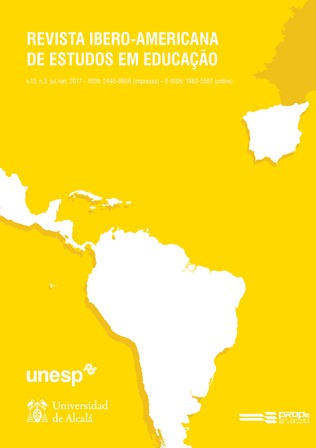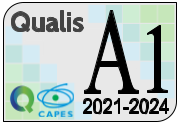International education in an interactive virtual learning environment: experimenting with digital media applications for community-based development
DOI:
https://doi.org/10.21723/riaee.v12.n.3.2017.10019Palavras-chave:
International education. Digital media. Community-based development. Virtual learning environment.Resumo
The article draws on empirical data to assess learning outcomes from an interactive course on digital media for community development. Taught jointly through the Sustainable International Development program (SID) at Brandeis University and the State University of São Paulo (UNESP) graduate program on Media and Technology, the Learning Across Borders (LAB) course enabled international working groups to create digital media-based solutions to development challenges in health, education, environmental conservation, income generation and civic engagement. The purpose of the research was to test whether positive learning outcomes generated by a problem- and project-based pedagogical approach could occur in an international virtual learning environment. Digital technology created the learning environment and was also the topic of study, a convergence that further strengthened the course results. Based on a conceptual framework showing how information and communication technologies can enhance participatory development models, as well as on an analysis of student projects and survey data, the article concludes that the course format and implementation provide an innovative model for graduate level professional education in media and development.
Downloads
Referências
ADERA, E. O.; WAEMA, T. M.; MAY, J.; MASCARENHAS, O.; DIGA, K... ICT Pathways to poverty reduction: empirical evidence from east and southern Africa. Rugby, UK: Practical Action Publishing, 2014. 243pp.
BURRELL, J.; TOYAMA, K. What Constitutes Good ICTD Research?. Information Technologies and International Development, Cambridge, v.5, n. 3, p.82-94, 2009. Disponível em: <http://ictlogy.net/bibliography/reports/projects.php?idp=1590>. Acesso em: 13 jun. 2017.
CHAMBERS, R. Whose reality counts?: Putting the First Last. London: Intermediate Technology Publications, 1997. 297pp.
COCHRANE, T., BUCHEM, I., CAMACHO, M., CRONIN, C., GORDON, A., KEEGAN, H. Building global learning communities. Research in Learning Technology. v.21, n. 21955, 2013. Disponível em: <http://dx.doi.org/10.3402/rlt.v21i0.21955> Acesso em: 15 jun. 2017.
CORTESI, S. et alli. Digitally Connected: Global Perspectives on Youth and Digital Media (March 26, 2015). Berkman Center Research Publication No. 2015-6, 2015. Disponível em: <http://dx.doi.org/10.2139/ssrn.2585686>. Acesso em: 22 mar. 2017.
DE GRAFF, E.; KOLMOS, A. (Eds.). Management of change implementation of problem-based and project-based learning in engineering. Rotterdam: Sense Publishers, 2007.
ESCOBAR, A. ‘Post-development’ as concept and social practice. In A. Ziai (Ed), Exploring post-development theories and practices (pp.18-31). Milton Park, NY: Routledge, 2007.
GUMUCIO-DRAGON, A. Take Five: A handful of essentials for ICTs in development. In B. Girard (Ed.) The one to watch: Radio, New ICTs and Interactivity (pp. 21-38). Rome: Friedrich Ebert Foundation and Food and Agriculture Organization of the United Nations, 2003.
HEEKS, R. Theorizing ICT4D Research. Information Technologies and International Development. Cambridge, v.3, n.3, p.1-4, 2006. Disponível em: <http://itidjournal.org/itid/article/download/227/97>. Acesso em: 13 Jun. 2017
HIGGINS, L.; WOLF, M. M.; TORRES, A. M. Opening the Doors to a Global Classroom: An International Social Media Collaboration. NACTA Journal, September 2013. p.40-44. Disponível em: <http://www.jstor.org/stable/nactajournal.57.3a.40>. Acesso em: 14 Jun. 2017
SMITH, M.L.; ELDER, L.; EMDON, H. Open Development: A New Theory for ICT4D. Information Technologies and International Development. Cambridge, v.7, n.1, p.iii-ix, Spring 2011. Disponível em: <http://itidjournal.org/index.php/itid/article/view/692/290>. Acesso em: 14 jun. 2017
TOYAMA, K. Can Technology End Poverty?. Boston Review. November, 2010. Disponível em: <http://bostonreview.net/forum/can-technology-end-poverty>. Acesso em: 15 fev. 2017
UNFPA - UNITED NATIONS POPULATION FUND. The Power of 1.8 Billion: Adolescents, Youth and the Transformation of the Future. New York: UNFPA, 2014. Disponível em: <http://eeca.unfpa.org/sites/default/files/pub-pdf/EN-SWOP14-FINAL-web.pdf>. Acesso em: 15 jun. 2017
UNITED NATIONS. Transforming our world: the 2030 Agenda for Sustainable Development, 2015. [Online] Disponível em: <http://www.un.org/ga/search/view_doc.asp?symbol=A/RES/70/1&Lang=E>. Acesso em: 9 jun. 2017
WARSCHAUER, M.; AMES, M. Can One Laptop per Child Save the World's Poor? Journal of International Affairs. New York, v. 64, n.1, p. 33-51, Fall/Winter, 2010. Disponível em: <https://www.jstor.org/stable/24385184>. Acesso em: 5 jun. 2017
ZUCKERMAN, E.. New Media, New Civics?. Policy & Internet, v.6, n.2, p.151-168, June, 2014. Disponível em: <http://dx.doi.org/10.1002/1944-2866.POI360>. Acesso em: 22 out. 2016.
Downloads
Publicado
Como Citar
Edição
Seção
Licença
Manuscritos aceitos e publicados são de propriedade dos autores com gestão da Ibero-American Journal of Studies in Education. É proibida a submissão total ou parcial do manuscrito a qualquer outro periódico. A responsabilidade pelo conteúdo dos artigos é exclusiva dos autores. A tradução para outro idioma é proibida sem a permissão por escrito do Editor ouvido pelo Comitê Editorial Científico.








